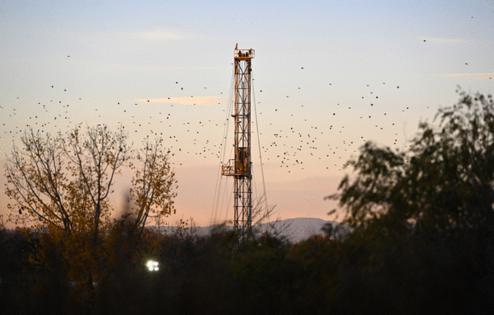One Colorado county's property values just plummeted. Here's why officials aren't panicking amid oil booms and busts.
Published in Home and Consumer News
The subject line of a press release this month from Weld County, Colorado, was stark and foreboding: “County’s assessed value sees 20% decrease.”
The cratering of taxable property value in the large county that hugs metro Denver’s northeast corner — from nearly $25 billion in 2023 to just under $20 billion this year — would probably send many county finance directors running to the medicine cabinet for a fistful of antacids.
But for Cheryl Pattelli, it’s all part of managing the books for a county whose economy relies largely on boom-and-bust commodity industries, like agriculture and energy, that can experience wild swings in both price and production.
Energy, in particular, plays an outsized role. The industry produced a state-leading 135 million barrels of oil in Weld County in 2023 and makes up nearly 60% of the county’s total valuation. It was the high price of oil in 2022 — topping $120 a barrel on several occasions — that helped set the assessed valuation for the 2023 tax year in Weld County. Valuations reached a record $16.8 billion in the energy sector alone.
But when oil prices declined in 2023, the value of oil and gas production and equipment in Weld County plummeted 31%, to $11.5 billion. That year’s dynamics formed the basis for this year’s assessed values.
“We are used to big fluctuations,” said Pattelli, Weld County’s chief financial officer. “We’re completely used to the ups and downs in oil and gas, and we’ve created budget policies to account for that.”
In fact, Weld County projects that next year it will take in the most property taxes it has ever collected in its history — $306 million, a $17 million premium over this year. How that’s possible when tax valuations are in free-fall comes down to adjustments the county has made to its mill levy, or rate of taxation, to ensure its budget remains whole.
Specifically, the county hiked its mill levy about 30%, from around 12 mills to nearly 16 mills. The higher rate still remains within the strictures of Colorado’s Taxpayer’s Bill of Rights, which requires a vote of the people before a government can collect more taxes above a level allowed by a formula that accounts for population growth and inflation.
On top of that, said Commissioner Kevin Ross, the Republican-leaning county practices fiscal self-discipline.
“We keep our budgets low so we don’t get in a pickle,” Ross said. “That’s why we don’t go spending everything we have.”
Weld County also has a $230 million reserve fund it can tap to help get through tough times.
A push for economic diversification
While the energy sector showed weakness in the 2024 valuations, residential property values in the fast-growing county climbed 3.3% to $3.35 billion. Commercial and industrial values also went up.
Weld County, which includes Greeley, is one of the fastest-growing counties in Colorado, having gained more than 100,000 residents since 2010. It has a population of about 369,000, which is expected to approach 600,000 by 2050.
And with that population growth, Weld County’s economy is becoming increasingly diverse, said Rich Werner, president and CEO of Upstate Colorado Economic Development. Some of the county’s growing industries are food processing, biosciences, construction and renewable energy, including a Vestas wind turbine plant in Windsor.
“Oil and gas and agriculture will always be our base industries,” Werner said, “but we continue to push on diversification to further support these emerging areas.”
The Federal Reserve Bank of St. Louis pegs Weld County’s 2023 gross domestic product at $28 billion — just ahead of Douglas County, at $27 billion, and behind Boulder County, at $35 billion.
But Werner worries about recent regulations that have been placed on the oil and gas industry, most notably a 2019 state law overhauling oversight of the industry.
“When companies are looking to come to a region, they are looking for not only economic certainty but political certainty,” he said. “I’m worried about the business climate in the state — we are seeing in study after study that it is harder and more expensive to do business in the state.”
More barriers for oil and gas
Last year, a survey of 156 Colorado business leaders showed that four in 10 of those asked said they believed the state’s economy was headed in the right direction, while the remainder said it was on the wrong track. Nearly two out of three business leaders cited regulatory compliance as a top concern, with most worries centered on state rules.
Ross, the county commissioner, says it’s harder these days for energy companies to get their permits to “put up their rigs and punch a hole” in the ground. And many operators remember the dramatic retrenchment within the industry just a few years ago, in the face of a price crash due to the coronavirus pandemic and the shutdown of the global economy.
“If production drops off and you have a state that is not friendly to oil and gas development, that’s going to negatively impact Weld County in a drastic way,” he said.
In the meantime, solidly red Weld County will continue with its disciplined approach to fiscal management, Ross said, regardless of oil price fluctuations or state regulations set largely by Democratic officeholders and appointees.
The county has no sales tax, issues no debt and is one of just 11 counties in Colorado that has yet to “de-Bruce.” That colloquialism, inspired by TABOR architect Douglas Bruce’s name, refers to a government asking voters if it can retain tax revenues beyond what the constitutional amendment allows.
Weld’s approach should keep business interest in the county alive and residents not feeling too burdened by taxes, he said.
“Weld County is in a strong place — we’re used to this,” Ross said.
©2024 MediaNews Group, Inc. Visit at denverpost.com. Distributed by Tribune Content Agency, LLC.








Comments